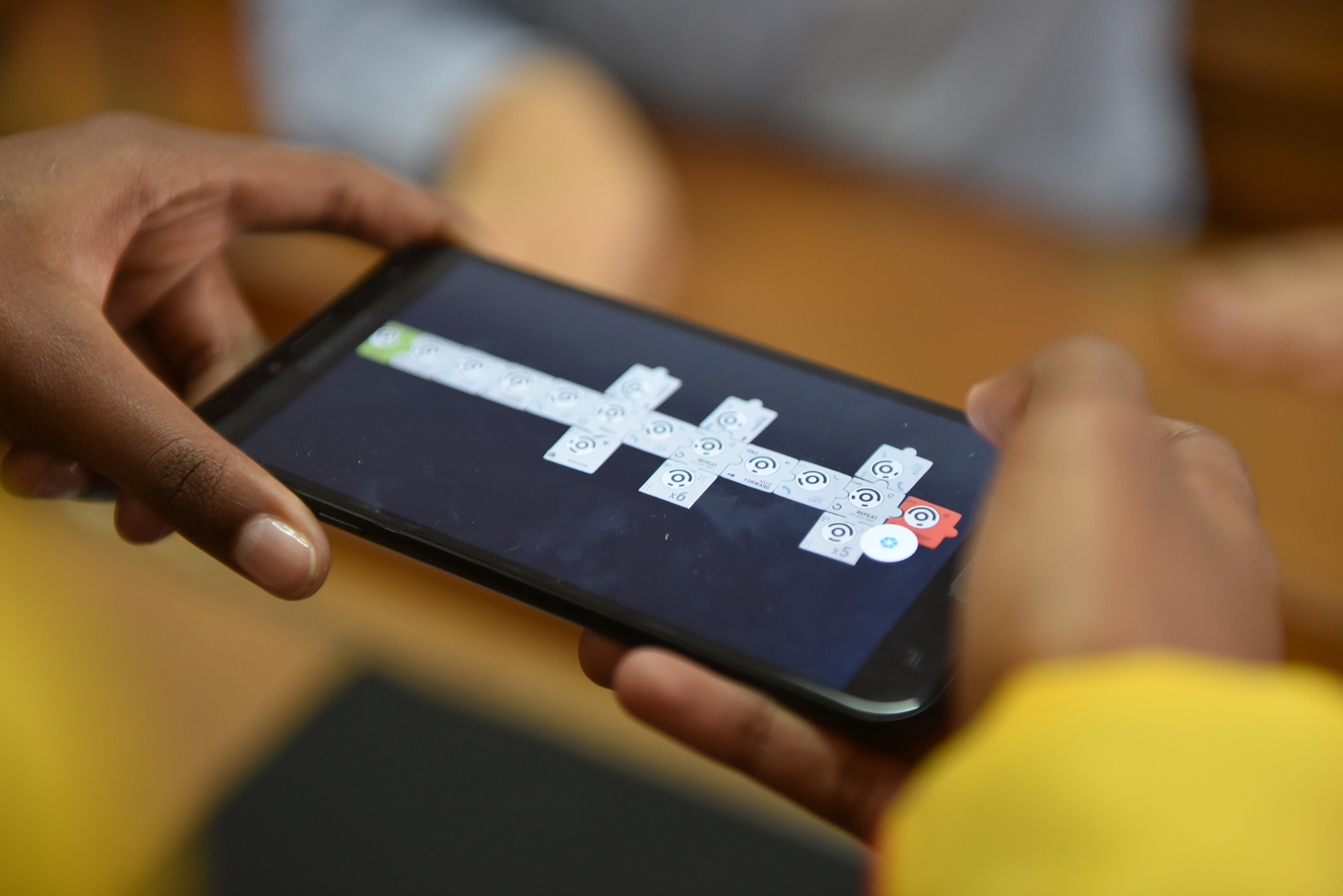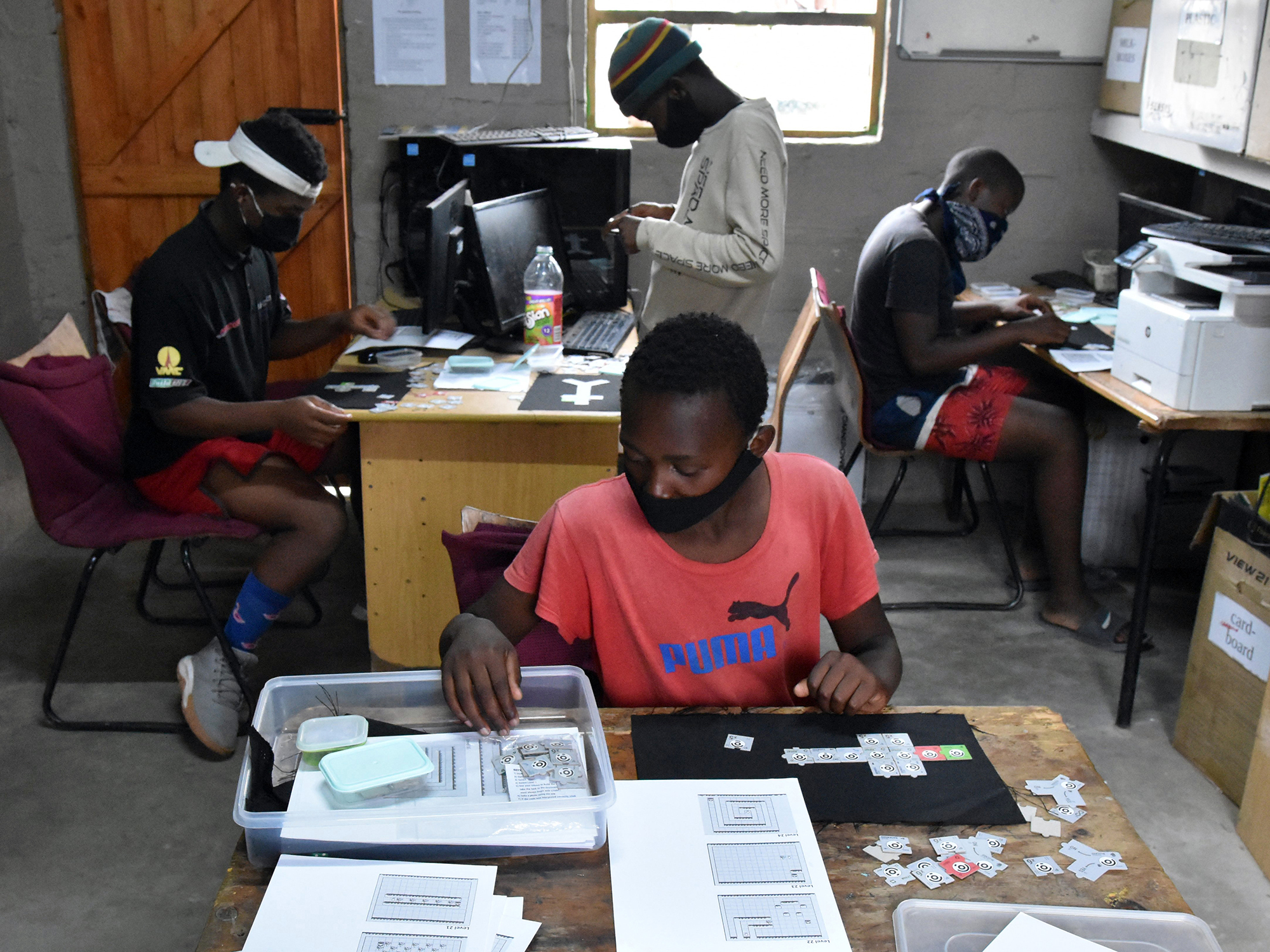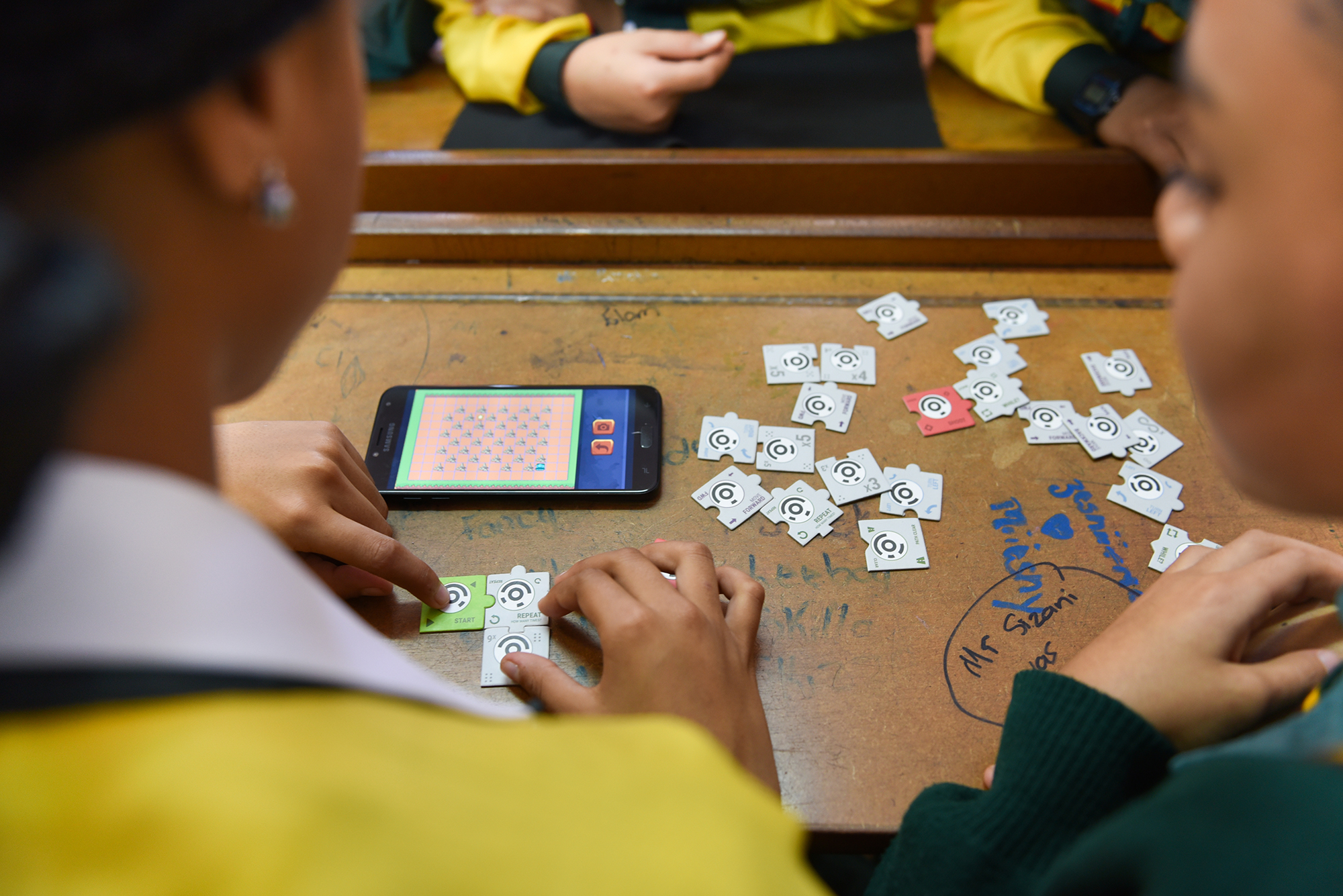First published in the Daily Maverick 168 weekly newspaper.
With old-fashioned puzzles, a few smart phones and a few clever apps, Nelson Mandela University professor Jean Greyling and his team are teaching computer coding to thousands of students who do not have access to computer laboratories.
When confronted with a desperate need to introduce coding in schools that did not have computer laboratories, Greyling and Byron Batteson, one of his honours students, turned to the age-old craft of building puzzles. “For many years my students said we must do something to make children aware of software development,” said Greyling, who has been a lecturer at Nelson Mandela University since 1992 and is now a professor.
This was always also going to be an uphill battle: about 16,000 of the 25,000 schools in South Africa do not have proper computer laboratories. The cost of a laboratory is upwards of R1-million.
“Our first project was a dictionary with IT terms that we distributed through Mxit. It became very popular. At one stage we were getting up to 100,000 queries a month,” Greyling told DM168.
“Then one of my students, Byron Batteson, who now works at Amazon in Cape Town, did his honours degree in how to teach children about programming in an affordable way. Most of the kids’ coding projects that had existed at the time were based on the use of robots, that cost around R7,000, computers and the internet. Only five children could play with the one robot.”
 (Photo: Roxy Klein)
(Photo: Roxy Klein)
In 2017, Batteson designed a game called Tanks. The game uses puzzle pieces, image recognition and a mobile app to teach children coding concepts without the use of a computer. Greyling said this allowed them to introduce coding in schools, using six to eight smartphones, at a cost of around R10,000 – significantly cheaper than building a computer lab.
The app, which is designed primarily for pupils aged 10 to 14, consists of puzzles showing a tank moving through a maze. Learners must follow directions and build a puzzle to solve the problem. They then photograph the solution. In this way children are taught how to “program” the tank.
Since the launch of the app in November 2017, Greyling has been co-ordinating coding bootcamps for 20,000 learners across South Africa, as well as in Zambia, Kenya, Mozambique, Namibia and Norway.
A teacher from East London developed seven lesson plans aimed at introducing young primary school learners to coding through Tanks. This led to the launch of the Tanks school kit in 2019. It contains lesson plans, instructional videos, solution sets and other resources that empower a school to start its own coding club.
Greyling said that, apart from the shortage of computer labs, many schools also lacked educators who could teach coding. Software development is regularly identified as one of the scarcest skills in the country.
Tanks has been presented to the United Nations Educational, Science and Cultural Organisation, and has won many awards.
Greyling said they had reached more than 20,000 learners in interactive coding workshops across South Africa, had trained more than 40 facilitators, and distributed the game and coding kits to about 200 schools.
Since the launch of Tanks they have also introduced Boats, about marine pollution, and a third game, Rangers, which teaches coding along with a message about game poaching.
When the outbreak of Covid-19 made the further implementation of the project seem impossible, Greyling took stock.
“For a few weeks in April I went into a state of limbo regarding the coding project, and in my mind I ‘parked’ it for a year,” he said. “But then industry partners started asking whether there was nothing that could be done for learners who were stuck at home. This prompted the team to make some changes to the Boats coding app, which allowed for virtual coding tournaments.
 Jean Greyling, Associate Professor at the Department of Computing Sciences, Nelson Mandela University. (Photo: Roxy Klein)
Jean Greyling, Associate Professor at the Department of Computing Sciences, Nelson Mandela University. (Photo: Roxy Klein)
“This turned out to be very popular with teachers, learners, parents and sponsors. Three virtual tournaments saw over 1,000 learners submit nearly 30,000 scores from across the country.
“Sponsorships worth nearly R200,000 were raised, which went towards various incentives, including tablets, free data and even donations towards various social engagement projects. This included providing free coffee to medical workers taking care of Covid-19 patients, assisting Sanccob, which takes care of sea birds, as well as purchasing shoes worth R30,000 for learners who were affected by Covid-19.
“We have introduced over 1,000 learners to coding in a year when it seemed impossible,” Greyling said.
“I like presenting workshops myself, just to see the children’s energy. They start a little bit slowly but after the first 10 minutes they get so excited about playing and learning. This is what keeps me going,” he said. “Even with the teachers, when we get started, they have to stop us after an hour.
“Everyone loves the energy of learning something new, completing levels and having a bit of healthy competition,” he said.
Greyling said they had noticed that girls were doing much better than boys in coding up to Grade 7. “Our 2018 national tournament was won by a Grade 7 girl,” he said. “They are focused and they think logically. We seem to lose them when they go to high school, though.
 (Photo: Roxy Klein)
(Photo: Roxy Klein)
“We want to expand the career horizons for the kids. We want them to dream about the possibility. One of the girls that originally took part in our project told me she became interested in code when she read The Da Vinci Code by Dan Brown. At the time, she was living in the rural Eastern Cape, in Mount Frere. But she started dreaming of studying computer programming one day,” he said.
“That is all I want. The kids must just start dreaming. I do add, though, that they must work hard at maths as well,” he said.
“In 2018, on Mandela Day [18 July], I told the kids, ‘Let me know when you have finished all 35 levels of Tanks.’ One boy took only three days. He was in Grade 11 then. He is now studying software development. I think he is our first concrete result of this project.”
He said they were keen to train facilitators at NGOs as well, to broaden the reach of the project. “An excellent example of this is an NGO we are working with in Port Alfred. The project continues on its own. I don’t have to go any more,” he said.
Describing how they deal with Covid-19 restrictions, Jan Blom, who runs the workshops for the NGO Nemato in Port Alfred, said they had reopened the Tanks class for a maximum of four learners only. “The classes are daily, so we still make good progress. We run it under a different format: the learners work individually at their own pace. Nobody can hide in the group, so there is no more need for a test. When a learner finishes the course, we can offer the certificate.”
 Mike Hlangane (15) and (left to right) Siyanda Qutywa (17), Axole Tokota (14) and
Mike Hlangane (15) and (left to right) Siyanda Qutywa (17), Axole Tokota (14) and
Vuyolwethu Mavuso (15) playing Tanks in Port Alfred. (Photo: Jan Blom)
In the coming week, Greyling will be launching a Boats app for children in Grade R to Grade 2.
“I think there is lots of room here for one of the big global companies, an Amazon or a Google, to get involved,” he said.
He shares an email addressed to him by a student from a rural area in the Eastern Cape as his latest bit of motivation: “A STEM [Science, Technology, Engineering and Mathematics] club in my community is one of my biggest dreams when I complete the degree.
“Currently, my community has no programmes or any sports for young kids. No one is guiding or motivating the kids. I also never had any dreams growing up and I had no idea as to what I wanted to be when I grow up. I only went to school because my mom would never allow me to miss a day.
“I did not go there with the intentions to learn, but I went there with the intentions to just move to the next grade. After being introduced to IT and solving problems that seemed more realistic I started to get a feel of what education is meant to be. I wanted to learn more and solve more problems.”
Andrew White from Nelson Mandela Bay-based technology company S4, said it was the largest employer of software developers trained by Nelson Mandela University. “The demand for good developers outweighs the supply. The Tanks/Boats/Rangers project is a means for us to help grow interest in software development for the future and also a way to help previously disadvantaged communities,” he said.
LexisNexis CEO Videsha Proothveerajh, said the company’s involvement with the Boats tournament was part of its annual RE Cares Month programme but also part of its bigger drive to encourage young, talented South Africans to be exposed to the world of software development.
“LexisNexis has a software development office based in Nelson Mandela Bay, which has been on the rise as a software development city. We regularly work with Nelson Mandela University to attract talented students and graduates, and the Boats tournament partnership certainly gave us the opportunity to encourage an interest in technology among even younger South Africans.
Technology exposure is very important to us as a company invested in tech solutions that serve the legal, professional and government sectors,” she said. DM168
This story first appeared in our weekly Daily Maverick 168 newspaper which is available for free to Pick n Pay Smart Shoppers at these Pick n Pay stores.





 Mike Hlangane (15) and (left to right) Siyanda Qutywa (17), Axole Tokota (14) and
Vuyolwethu Mavuso (15) playing Tanks in Port Alfred. (Photo: Jan Blom)
Mike Hlangane (15) and (left to right) Siyanda Qutywa (17), Axole Tokota (14) and
Vuyolwethu Mavuso (15) playing Tanks in Port Alfred. (Photo: Jan Blom) 